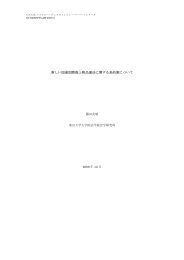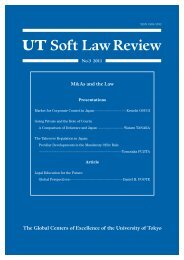UT Soft Law Review
UT Soft Law Review
UT Soft Law Review
You also want an ePaper? Increase the reach of your titles
YUMPU automatically turns print PDFs into web optimized ePapers that Google loves.
<strong>UT</strong> <strong>Soft</strong> <strong>Law</strong> <strong>Review</strong> No.2 2010can be broadly categorized as follows.(i) Cases where adequate time and information necessary for shareholders toappropriately decide whether to support or oppose the takeovers andopportunities for negotiation between the acquirers and the target companiesare ensured by takeover defense measuresDecision of the Tokyo District Court on the Japan Engineering Consultants Co.,Ltd. 7 case (July 29, 2005)(ii) Cases where takeover defense measures are implemented based on thesubstantive judgment in view of the contents of the takeover proposals in orderto deter the takeoversDeterring takeovers by implementing takeover defense measures generallydeprives shareholders in favor of the takeovers of the opportunities to sell theirshares to the acquirers. Therefore, the implementation of takeover defensemeasures based on the substantive judgment in view of the contents of thetakeover proposals should in principle be limited. Based on the examination ofpast judicial decisions, cases where such implementation would be permitted arecategorized into the following two typical cases in accordance with thecharacteristics of the acquirers and their behavior.(a) Cases where takeover defense measures are implemented against abusivetakeovers that are clearly detrimental to the shareholder interestsDecision of the Tokyo High Court on the Nippon Broadcasting System Inc.case 8 (March 23, 2005)(b) Cases where takeover defense measures are implemented based on thesubstantive judgment that the takeover proposals are detrimental to theshareholder interestsDecision of the Supreme Court on the Bull-Dog Sauce Co., Ltd. case 97 Hanrei jiho [Judicial precedent report] No. 1909: 87. Regarding a case where not the gratis issue of stockacquisition rights with differential conditions for exercise and calloption clauses, but stock split, which doesnot cause the acquirer to bear a loss of thedilution of his shareholding ratio resulting from theimplementation, was used as thedefensive measure, the court ruled that, for shareholders to decidewhether to delegatethe management of the company to either incumbent management or thehostileacquirer, the board of directors can be permitted to take suitable measures against thehostiletakeover in order to ensure necessary information provision and a suitableperiod for consideration, as longas such measure does not violate the spirit or the intentof related laws and orders.8 Hanrei jiho [Judicial precedent report] No. 1899: 56. In this case, the court ordered the provisionalinjunction against the issuance of stock acquisition rights to a thirdparty, for the reason that the relevanttakeover can not be found to be abusive. In thatdecision, however, the court ruled that takeovers within acertain scope are categorizedas abusive ones and against such takeovers the board of directors canimplementtakeover defense measures.9 Saiko saibansho minji hanrei shu [Civil case precedents of the Supreme Court] Vol. 61 No. 5: 2215.Regarding a case where a takeover defense measure was implementedbased on the resolution of thegeneral meeting of shareholders, the court recognizedthat nearly all shareholders other than the acquirer96





